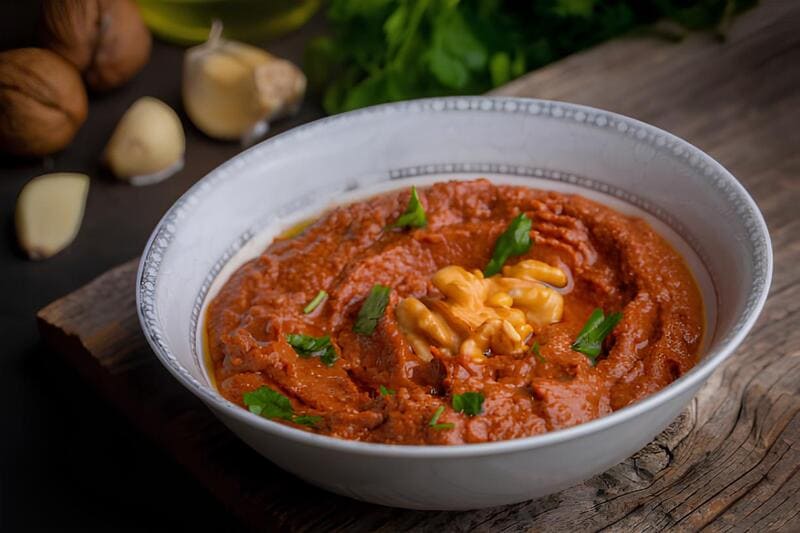
Muhammara, a cherished dish often enjoyed alongside grilled meats, originates from Syria but has also found a home in Turkish and Lebanese cuisines. Known for its robust, spicy, and nutty flavor, it beautifully balances sweet and savory elements, making it a beloved appetizer around the Mediterranean.
This authentic muhammara recipe gives a glimpse into the traditional ways of preparing this red pepper and walnut dip, offering both a rich history and a straightforward, easy method. With accessible ingredients and optional tweaks, it’s perfect for bringing a taste of the Middle East to your kitchen.
Ingredients
- 4 large red bell peppers
- 1 onion, finely chopped
- 1 cup finely chopped walnuts
- 3 tablespoons pomegranate molasses
- 4 tablespoons tahini
- ½ cup olive oil
- 1 teaspoon cumin
- 1 teaspoon dry coriander
- 1 teaspoon black seed
- 1 teaspoon salt
- Optional: 1 cup rusks or breadcrumbs
- Optional: Toasted sesame seeds for garnish
Preparation
- Preheat your oven to 220°C (430°F) and line a baking tray with parchment paper.
- Wash and seed the red bell peppers, then cut them in half and place them on the tray.
- Drizzle the peppers with a small amount of olive oil and roast under the grill until they start to brown.
- Transfer roasted peppers to a plate, pour over any remaining oil from the tray, and cover. Let them cool for about 20 minutes.
- Once cooled, peel the peppers and place them in a grinder. Grind until a smooth consistency is achieved.
- Transfer the ground peppers to a bowl, add pomegranate molasses, finely chopped walnuts, onion, and the remaining olive oil.
- Stir in the tahini, cumin, dry coriander, black seed, and salt. Mix well to combine all ingredients.
- If using, gradually add rusks or breadcrumbs until the desired texture is reached.
- Serve the muhammara on a plate, garnished with walnuts, pomegranate seeds, and a drizzle of olive oil.
Did you know?
Muhammara, also spelled muhammara or mhammara, literally translates to ‘red’ in Arabic, owing to its vibrant red color. This dish has a fascinating history and origin, dating back to ancient times in Syria and Turkey. The use of nuts, especially walnuts, in Middle Eastern cuisine, is a testament to the region’s rich agricultural heritage. Pomegranate molasses, another key ingredient, adds a unique sweet-sour flavor that has been appreciated for centuries.
In Egypt, muhammara has also garnered popularity and is often seen as a versatile component in various dishes, including pastries. Each region has its unique spin on the recipe, with some preferring a coarser texture while others favor a smoother dip. Additionally, the black seed, known for its health benefits, is a common feature in traditional Egyptian and Syrian recipes.
The adaptability of muhammara is remarkable; it can be a hearty dip, a spread for sandwiches, or even mixed with pasta. So, whether you’re enjoying it the traditional Syrian way or incorporating it into an Egyptian meal, muhammara is undoubtedly a flavorful addition to any table.
Feel free to use this expert knowledge to impress your friends and family with a truly authentic and delicious dish!
